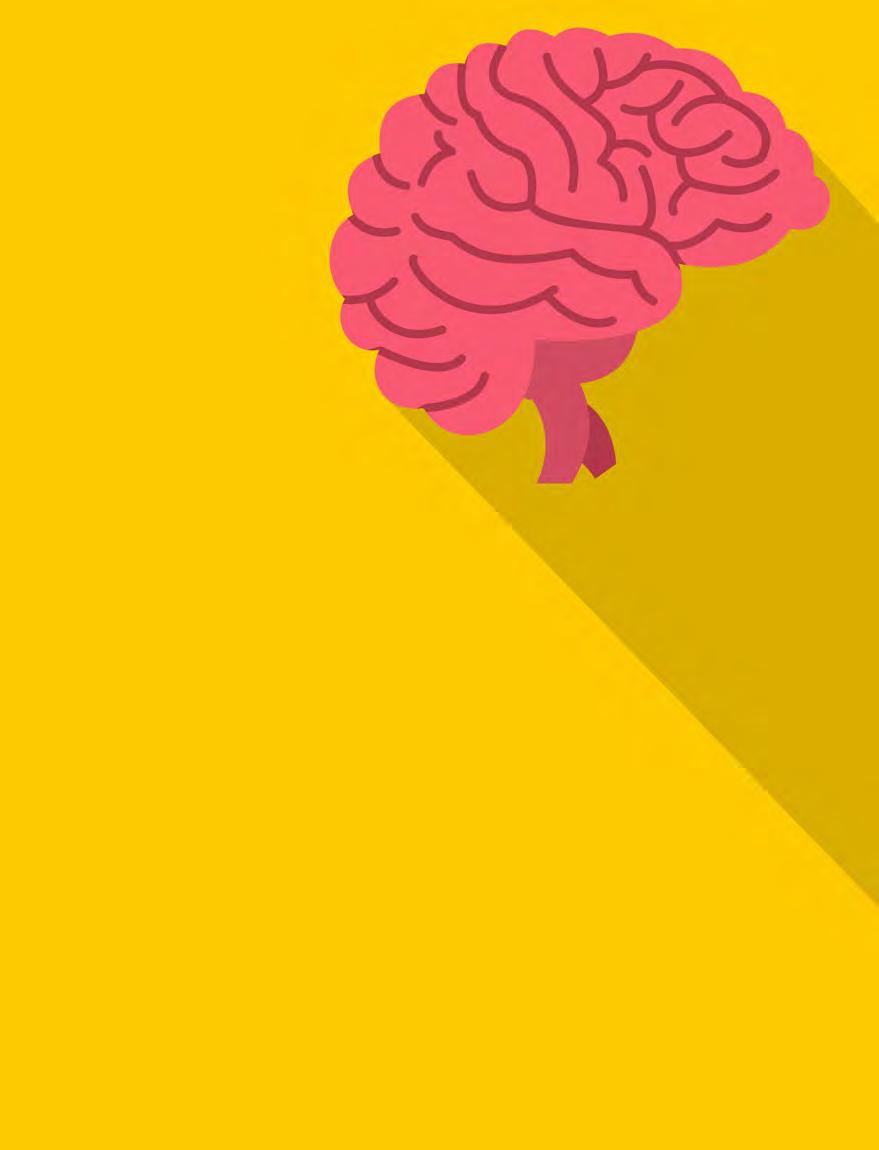
34 minute read
MIND
INTRODUCTION TO YOUR MIND
You may not feel it now but going to university is a lifechanging event – whether you’re commuting from home or living on campus. Students have never faced pressure quite as much as they do today. Concerns about workload, finances, housing, relationships, social media and uncertainty about the future can cause a detrimental effect on the mental health of students. Just remember that it’s perfectly fine to say, “I am not OK.”
Mental health is just as important as our physical health. Thankfully, society is becoming more accepting of people who are honest about their mental health, and the more people who speak up, the more accepted it will become to seek help.
Mental health is critical to our wellbeing, but there are times in life when we all struggle. The key to mental resilience is learning when and how to ask for help…
STRESS & YOUR BRAIN External pressures – such as falling behind at uni, a toxic friendship or being bullied – can have a huge impact on your brain. When stressed like this, the brain releases excess cortisol (a stress hormone), which has been linked to memory loss and premature brain ageing. Stress can manifest itself in many different ways –you might feel a sense of panic (think: jittery limbs, sweating, shortness of breath, a faster heart rate, etc) and you might even get a headache or stomach ache. While it’s impossible to eliminate all stress in your life, there are ways to reduce it.
If you’re suffering from mental ill health such as depression, anxiety or any other unusual thoughts, tell a trusted friend or parent, your GP or Student Services as soon as you can. GETTING HELP MANAGING STRESS Stress often comes and goes, usually when you’re pushed out of your comfort zone – like when facing a tough exam or going for an interview. If you’re feeling tense and anxious, try these techniques to calm your nerves:
■ It’s common to be nervous of the unknown, so think through some of the common eventualities and plan out what you’ll do – that way you’ll feel prepared and calmer about the outcome.
■ Make time to relax and meditate. Sit in a quiet area, close your eyes and take five deep breaths, in and out.
■ Get a decent night’s sleep, so that you feel rested and ready for the new day.
■ Go for a walk to get some fresh air and clear your head.
■ Thinking positively about the things you can control is more likely to help you overcome the hurdle you’re facing. If you don’t get the job you applied for, there will be another.
THE BEST MIND APPS
All of these are available for free and are suitable for both Apple and Android phones:
Headspace: This app makes meditation simple. Through the guided sessions, learn meditation and mindfulness in just 10 minutes a day.
Peak Brain Training: Challenge your cognitive skills with over 30 fun games. View your Stats to track your progress over time.
SAM: Developed by a team of psychologists, this app offers a range of selfhelp methods for people who are serious about managing their stress and anxiety levels.
MAYBE THERE’S AN APP FOR THAT
MANAGING STRESS & ANXIETY
Starting uni is full of new experiences, new friends, new surroundings and, for most, a completely new way of life. This should be a really exciting time, but feeling stressed and anxious is completely normal for most students. Here’s how to cope…
In a recent UniHealth survey, 82% of first and second-year student respondents at UK universities said they were suffering from stress and 45% have experienced depression. It’s unsurprising in some respects – starting university is a big life step and one that often requires major upheaval. It’s likely you’ll have moved away from your home, mates and family. You need to make new friends, orientate different surroundings and deal with new academic pressures. Add in the burden of student debt, dayto-day financial concerns and pressure to have an amazing
UNI IS VERY DIFFERENT TO SCHOOL AND IT’S LIKELY YOUR COURSE WILL BE A MAJOR STEP UP

‘uni experience’ and it’s no surprise that sometimes life can seem overwhelming. For some students, it’s exceptionally challenging – one in five respondents in the UniHealth survey said they have had suicidal feelings. What’s more alarming is that only 25% of students experiencing stress and depression said they would seek help. Many others said they were “too embarrassed” or they were unaware that help was available to them.
One of the biggest challenges when starting uni is that everyone appears to be coping well and taking the new experience in their stride. They seem to have made friends, post amazing photos on Instagram, and hand in all of their assignments on time. But behind the scenes, the reality is often completely different. There are very few people who don’t suffer from stress or anxiety at some point, so it’s important to realise that you’re not alone or different.
GETTING HELP Whilst mental health to go to for help – speaking to awareness has become more a parent or a friend could be prominent in recent years, a good place to start. Going lots of people still struggle to to see someone at your uni’s come forward and seek help. counselling service or your GP Often, they feel embarrassed is another good option – they or weak, especially understand the pressures when they believe they on students and can should be having the offer bespoke support. time of their life. The good news is that HELP If you prefer to speak to someone confidentially, there are various places you can call the Samaritans (free on 116 123) or text, e-mail or call Nightline (nightline.ac.uk), which is an overnight listening service run by students for students between 8pm and 8am.
Remember that it takes strength and courage to say you need support, and no one will ever judge you for seeking it.
SOCIAL MEDIA AND PERFECTIONISM
It’s not easy scrolling through your social media feeds and seeing beautiful people travelling to incredible places and experiencing amazing things. Sometimes we wonder why our photos don’t match up – even after we’ve posed 20 times, cropped out our mates with their eyes closed and applied a Lark filter, they still don’t seem to compare. The truth is that the photos you’re looking at are usually heavily edited and often give a distorted view of reality. For example,


some celebs have been caught Photoshopping their pics, and pretty much everyone posts only the best bits of their life. (When did you last post a photo of yourself doing the laundry?) Others have been known to hire sports cars and swanky Airbnbs to give the illusion of a millionaire’s lifestyle. The reality? All smoke and mirrors. So, the next time you feel envious of someone else’s life, body, car or house – or strive to be as ‘perfect’ as them – remember what you’re aiming for probably doesn’t even exist.

LOOKING AT DEPRESSION The pressures of being at university can be immense, making depression a fact of life for many students. Just remember that you’re not alone.
There will be moments when your time at uni won’t all go to plan. With exam stress, debt worries, pressure to achieve and trying to juggle part-time jobs, relationships and academics, it’s no wonder that students can be susceptible to stress, anxiety and low moods. But when does ‘feeling down’ turn into depression?
What is depression? How many times have you heard people say they’re depressed, when they’re really not? The English language doesn’t always have the right words to convey how we feel and not everyone’s understanding is the same. Being ‘a bit down’ or ‘fed up’ is very different from depression. If you’re feeling a bit low, you can usually make yourself feel better by sleeping it off or resolving the underlying issues, so the feeling goes away. But when you’re suffering from depression, it’s something that lasts for weeks or even months. It’s a state of mind that’s hard to escape from, no matter what you try. Sufferers sometimes feel that they’re not equipped with the skills to solve their problems and that there’s little point in trying.
When you’re feeling low, it’s easy to turn to drink or drugs, but that’s one of the worst things you can do. Both will ultimately make you feel even worse, even if they offer a brief reprieve. Instead, seek help. IT’S A FACT There’s also a misconception that the sufferer’s life must be a mess. But that’s the crux of depression: it doesn’t discriminate and can affect anyone regardless of perceived success, wealth or appearance.
You’re not alone The pressures of university life have led to a huge increase in depression among the student population. Since 2007, there has been a three-fold increase in students seeking help from Student Services, so while you may think that nobody else feels your pain, you’re actually far from alone. Since the symptoms of depression often come on gradually, sometimes it’s difficult to identify the condition early on, which delays doing something
SIGNS TO LOOK OUT FOR
The symptoms of depression vary from one person to another, but anybody suffering from it will be battling with at least some of these: ■ Feeling sad or hopeless ■ Losing interest in things they’ve previously enjoyed ■ Anxiety ■ Tearfulness ■ Poor sleep and tiredness ■ Unexplained aches and pains ■ Self-harming ■ Low self-esteem ■ Feeling intolerant or irritable ■ Finding decision making to be difficult ■ Paranoid thinking ■ Suicidal thoughts ■ Feeling that there’s no point in living
about it. In severe cases of depression, it’s possible to feel so low that you have thoughts of withdrawal, self-harm or suicide. You can also suffer from psychotic episodes, which is where you start to see, hear or believe things that aren’t real.
Even if you’re feeling fine, one of your friends or flatmates may not be, so look out for anyone struggling academically, taking part in fewer social activities or avoiding social contact altogether. They could also be neglecting their interests or be having problems at home or in a relationship. Stay vigilant – you could be the person who breaks the cycle.

Feel better, faster You can ease the effects of depression and keep your mind healthy by using these three techniques, courtesy of mental health charity Mind (mind.org.uk). ■ Break the cycle of negativity. Dark thoughts often breed more dark thoughts, so think of positive things you’ve achieved and things you’re grateful for.
■ Do something active to keep your mind on something else. It needn’t be strenuous.
■ Connect with others as often as possible, even if it’s just a quick phone call.
If you think you might be depressed, or are struggling with your mental health, seek advice from Student Services or your GP as soon as possible. These sites are good sources of information too:■ studentminds.org.uk ■ mind.org.uk GET HELP
ADDICTIONS
Sometimes we forget the reality is that a person can be addicted to just about anything – from drugs and alcohol, to sex and shopping. Whilst regularly doing something doesn’t necessarily mean you are addicted, if you are controlled by your habit, it can soon spell disaster. Here’s how to spot, and get help for addictions…
The NHS defines addiction as ‘not having control over doing, taking or using something to the point where it could be harmful to you’. While in some people this refers to substance abuse, in others, the addiction may be less obvious, such as:
■ Gambling ■ Gaming ■ Working or studying ■ Spending or shopping ■ Exercising ■ Internet and social media ■ Sex When does a habit become an addiction? To varying degrees, many people engage in some or all of the above activities. They may be habits (such as exercising or browsing social media), facts of
life (such as studying, working or spending) or things you enjoy (such as gaming or the odd bet here and there for fun). All of these things can be enjoyable and harmless. However, when you have no choice over the behaviour, then it’s likely the activity has become an addiction. Characteristics of being addicted include:
HOW TO TALK TO A FRIEND OR FAMILY MEMBER THAT MIGHT HAVE A PROBLEM It’s not easy to speak to a certain type of behaviour it may be better to pick the someone who you think recently. They may open up conversation up again when may be suffering from by themselves and be grateful they are in a better mood, or addiction for fear how they that someone is looking out ask for support from friends will react. Try to approach for them but be prepared that and a family. If they open up, the conversation in a light- they may deny or become show compassion and offer hearted way perhaps by defensive about their actions. to support them in getting saying that you have noticed If they aren’t in danger, then help.
■ Unable to control behaviour without overwhelming effort or professional intervention ■ An increase in the behaviour over time
Maybe you don’t think you have an addiction yet, but do feel like you’re gradually losing control. Now’s the time to get help – before it does turn into an addiction.

in order to get the same satisfaction ■ Inability to think or focus on anything else ■ Change in personality ■ Having a negative effect on a person’s academic, social and financial life. GETTING HELP If you see any of these characteristics in your own life, or identify them in someone you know, you need to get help. You might feel like you can beat the addiction alone, or someone may convince you that they can, but it’s better to get help to control the behaviour long-term. Acknowledging you have an addiction is a courageous thing to do – you will not be judged.
■ Alcohol Alcoholics Anonymous 0800 9177 650 alcoholics-anonymous. org.uk ■ Drugs Talk to Frank 0300 123 6600 talktofrank.com
■ Smoking Smokefree 0300 123 1044 nhs.uk/smokefree ■ Gambling Gamblers anonymous gamblersanonymous.org.uk ■ Gaming Video Game Addiction 08000 886 686 videogameaddiction.co.uk ■ Sex Sex and Love Addicts Anonymous 07984 977 884 slaauk.org
EXAM & ACADEMIC STRESS Studying a degree isn’t easy – there is so much content and never enough time. But don’t despair, as there are ways to make studying less stressful…
Stress usually occurs because we’re worried about the outcome – we often feel pressure from our tutors, family and ourselves to do well. We worry about what the effect may be on our life if we don’t get the grade we need, like not getting the job we want and how this may impact our future. On top of that, studying is tough – there are loads of distractions and heaps of content – you may feel you never have enough time and begin to wonder if you’re even reviewing the right thing.
YOU’RE NOT ALONE First off, acknowledge that you’re not the only one feeling stressed. Whether your peers admit it or not, it’s likely you’re all feeling the pressure. Sometimes, it’s great to chat it through with them, as they may give you some practical scheduling or revision tips. You could even talk with last year’s cohort of students to give you some perspective that there is light at the end of the tunnel.

STOP PROCRASTINATING It’s likely that the hardest part of studying is focussing on the work and not getting distracted, particularly by your mates who might have lectures and exams at different times. Another culprit is the internet. It might seem hard, but put down your phone. Turn it off. Put it in a drawer. Anything you have to do to avoid temptation. JUST GET STARTED When it comes to studying, the biggest hurdle is often just getting started. Begin your day with the hardest work and when you feel your focus slipping, take a short break and then get back to work as soon as possible. Try to put together a study schedule to keep on track. Adopt a positive attitude. Think “I’m going to give this 100%” – that way you’ll know you’re doing all that you can.
PRACTICAL TIPS FOR EXAM DAY
■ Get a good night’s sleep before the exam. Cramming late into the night is unlikely to help, as you’ll just end up tired, unfocussed and stressed during the exam. ■ Make sure you get up in good time so that you’re not rushing out of the door. ■ Have a good breakfast (see p48 for some speedy ideas) and drink loads of water. ■ Before you go into the exam, take a few deep breaths and visualise yourself feeling confident and relaxed during the exam. ■ After the exam, there’s nothing more you can do, so there’s no point worrying about how you did. Try not to talk to your friends about specific questions, as conflicting views may leave you questioning your own answers.
If your load gets too heavy, it could be a one-way ticket to burn-out. Speak to your tutors or Student Services for support if you are struggling with your course work-load, or if you are working too many hours in a part time job to make ends meet.
TIME MANAGEMENT People from all walks of life struggle with procrastination and time management and students are no exception. Here’s how to get stuff done.
At uni, good time management is one of the most valuable skills to learn. Possibly for the first time, you will be responsible for attending class, doing your work, preparing for exams, sorting your laundry, having a social life, managing your money, ensuring you eat properly … the list goes on and on. And whilst you might not have it cracked from day one, there are a few simple tips to help you get started:
1Work out what it is you need to do What you need to do and what you want to do may be different things. No-one wants to spend a Friday night in the library revising, but if it’s what you need to do to get where you want to be, do it. Make a list of all of the things you have to do (and when you have to do them by), and a list of the things you would like to do (think: parties and festivals).
2Create a plan Next up, you need a plan of action. Whether you use a scrap of paper to create a todo list, or a paper or electronic diary, block out some time to get the stuff you need to do done, and then fit in the stuff you want to do around it. If it goes on the list or in the diary, it’s non-negotiable – you have to get it done. Reward yourself if you stick to your schedule.
3Leave some space for downtime Word of warning – don’t over-pack your schedule or put an overwhelming number of things on a to-do list. Keep
THE NUMBER ONE TRICK TO AVOID PROCRASTINATION
Just get started. It might seem super simple but how many times have you put something off only to do it later and it was nowhere near as bad as you thought? If you set a timer and do five minutes of a project, assignment or to tackle some revision, you are more likely to keep going when the five minutes is up. Usually, the hardest thing is starting. Try it. it manageable and leave lots of time should things overrun or take longer than expected. Block out time to take care of yourself too – for rest, fun and exercise.
4Don’t take on too much There are so many opportunities at uni which is great – but you can’t do everything. If you are a serial ‘over-committer’, try to limit the amount you schedule, even if it’s just for a while. You can always add more commitments later.
5Account for ‘busy-periods’ The academic year has peaks and troughs in terms of workload. For example, on the lead up to and during exam period, your focus will be on your revising, but during the summer, that’s when you could pick up some extra money with a part time job. Use your time wisely to make sure to account for these changes in workload.

FEELING HOMESICK & LONELY
Being away from your family, friends and childhood home can be a really daunting experience. Here’s some practical advice...
Feeling isolated at uni can be a particularly difficult experience because everyone is hopeful you’ll be having loads of fun. From time to time, though, it’s likely that you’ll feel lonely or homesick, which can sometimes lead to feelings of disappointment, guilt or fears that you’re not normal (and that’s on top of what you’re already feeling).
First off, be realistic – everyone feels like this at some point, whether they
admit it or not. It might not look like others are struggling, but some probably are. Moving away from your home and everything you know – sometimes to a completely different country – is a massive undertaking. So don’t believe you’re a failure for feeling this way and neither should you feel guilty. Here’s how to get back on your feet and send homesickness packing…
Get plenty of exercise and eat well. If you’re feeling down, taking care of your body will help you feel better quicker (see our article about mental health & exercise on p64).
Bring some of your favourite things from home. Make your student housing as comforting as possible. Bring your stuff with you - bedsheets, posters and even Ted Bear - to make it feel like a home from home.
Keep a journal. Some people find writing their thoughts down really therapeutic. Write whatever you want – no one will ever see it but you.
Get outside. You may not fancy it but head outside to visit friends or just go for a walk. Being out in the fresh air really will help you feel better.
Keep in touch. Call, Skype or even snail mail with your friends and family back home and be honest about how you’re feeling. (But don’t spend all of your time chatting on Facebook and forget about life at university…)
MAKING FRIENDS For some people, making friends comes naturally, but for lots of people it doesn’t. Here’s some pointers to help you on your way

1Get involved in societies and clubs that interest you. By being there, you’ll have at least one thing in common with everyone!
2If you struggle meeting new people face to face, Is it worth the hype? Yes! Freshers’ Fair is a rite of passage for all new students. It’s a great out what’s going on and get involved in something new. What should I expect? use university Facebook pages or Twitter feeds to meet new people.
3Keep your door open in your accommodation or put a sign on your door to
FRESHERS’ FAIR Q&A
opportunity to meet second- and third-year students, find
show you’re up for a chat.
Row upon row of stalls with exhibitors ranging from sports and social societies to university department and local companies, like Wetherspoons or Domino’s.
How do I beat the nerves? Attending a Fresher’s Fair can be a bit full on for those who don’t like big crowds and introducing themselves to new people – especially as it comes during an exhausting week. The easiest way to combat nerves is to buddy up with someone and go together. Have an open mind about the Fair and if you start to struggle, step outside for a few minutes to take a short break. 4Don’t be afraid to smile and say “Hi”. What’s the worst that can happen?
5Remember at uni, you are all in the same boat. Making new friends is an expected and fun part of uni life!
Are there nonsporting societies? Of course! Your Freshers’ Fair will cover a huge range of societies. It’s amazing to see the variety – there really is something for everyone.
Is it just for Freshers?
Unless your institution specifically says so, attending is a great way to sign up to new things, or have a second chance if you missed out first time around.
BULLYING
You might think that peer pressure and bullying are generally confined to the playground. Sadly, you’d be wrong…
Bullying takes many forms – including name-calling, physical assault, spreading rumours, stealing, excluding people and turning someone’s friends or colleagues against them. Happy, secure people don’t bully others; it’s the bullies who have the problem, not those they target. Bullying is experienced by many people at some point, and sadly it doesn’t end at school – in the UK, nearly a third of people say they’ve been bullied at work. If you’re a target, you need to put an end to it. Here’s how:
■ Keep a diary: dates, times, places, who was there and what happened.
■ If you’re being cyber-bullied, save messages, screen grabs and call records – but don’t respond to the bully.
■ Tell someone right away. If it’s at uni, get in touch with Student Services. If it’s at work, tell your boss or a member of HR. If you’re being harassed outside of a formal setting, call the police on 101 (or 999 if it’s an emergency).
Driven to the brink If you bully someone, you could be responsible for pushing them to the brink. It’s easy to see picking on someone as harmless teasing, but nearly half of suicides of young people are because of bullying. Many other victims of bullying have to skip class or work because they can’t concentrate, and the effects on their self-esteem and confidence can last for years.

Whistle-blowing A ‘whistle-blower’ is someone who exposes information or activity that’s illegal, unethical or incorrect. Whilst this might refer to activities within an organisation, it can also refer to behaviour of individuals or workplace culture. If you witness bullying where you work or at your institution, it’s important to speak up, as the person being bullied may not have the courage to do so. You should tell someone within the organisation confidentially and make it clear if you wish to remain anonymous.
ONLINE BULLYING With the rise of the internet has come the rise of the trolls. Online (cyber) bullying can be just as hurtful as face-to-face bullying. Because we lead such connected lives, it can happen anywhere at any time. To deal with it:
■ Block abusers on social media or your phone.
■ Keep your personal details from those you don’t trust. ■ Adjust your privacy settings on social media to control who sees what.
If someone posts something online that you disagree with, just ignore it. Posting nasty stuff in the comments section is unnecessary. Think: “Would I actually say this to someone’s face?” While there isn’t a specific online bullying law in the UK, some actions can be criminal offences.
PEER PRESSURE

■ ditchthelabel.org■ ■ bullying.co.uk GET HELP

No one wants to be the victim of peer pressure, but it can easily happen. Sometimes, it’s pretty harmless: say, you’re trying to eat clean in the week and all your mates pressure you into ditching the diet in favour of a Pizza Express. Naughty but harmless! However, you might come across situations that are a little different, particularly if they’re unfamiliar.
It’s important to know the difference between harmless teasing from your mates, to participating in things that you genuinely don’t want to do, for fear of what people may say or how they may
STUDENTS ARE A DIVERSE BUNCH OF PEOPLE. IF YOUR NEW MATES DON’T QUITE ‘GET’ YOU, FIND SOME THAT DO
react. This is completely different for everyone – the experiences someone wants to participate in, and those they wish to decline, are personal to them. Even if their behaviour seems odd or unusual to you, it’s completely their choice and they should be allowed to do what they want without judgement or bullying.
So, why do people succumb to peer pressure, either knowingly or otherwise? Usually, it’s to fit in. If your mates are experimenting by using drugs, drinking alcohol and or being sexually promiscuous, it doesn’t mean you have to do this as well. Now is a great time to figure out who you are and the type of person you want to be. Students are a diverse bunch of people. If your new mates don’t quite ‘get’ you, that’s fine. Find a club or group of friends who do, and who accept you for who you are.

PERSONAL RELATIONSHIPS There are lots of benefits to having great relationships, but what should you do when they veer off track? T here are many types of relationship, but broadly speaking in healthy relationships. But when someone stops listening to you, or the dynamic in they usually fall into one the relationship starts to of four categories: family, sour and make you think friendship, romantic or “ugh”, it’s time to take swift professional. What’s normal action. If the relationship in one type of relationship may makes you unhappy, seem weird in another. In any consider cutting relationship, think carefully it off. And, if the about what you want out of it, relationship becomes what the other person wants abusive, tell someone out of it, and whether you’re you trust. If it’s anything comfortable. sexually abusive or
Consciously developing and illegal, speak to the working on relationships is a police on 101, or great way to keep them healthy 999 if it is an and strong. However, it’s also emergency. important to understand that you’re only one part of a relationship. People change, and so do circumstances. These are often beyond your control, so you shouldn’t blame yourself if a relationship gets tough or crumbles. Even though you might not be able to help the other person see things differently or make them change, you can control how you interpret what’s going on and how you behave. In other words, stay focussed on the things that you can change and don’t waste time and worry and about the things that you can’t.
Good communication and managing other people’s expectations are important
4SIGNS YOU NEED TO MOVE ON
Bad relationships can be the source of stress and anxiety. Here’s what to watch out for: ■ You no longer enjoy someone’s company. ■ You feel like they’re taking advantage of you. ■ You don’t trust them and/ or they don’t trust you. ■ They ask you to do things you don’t want to do.

Don’t let someone change who you are to be who they need. That’s just a recipe for disaster… TOP TIP DEALING WITH A BREAK-UP We know it hurts now, but it will get better, honest! Here’s how to keep moving forward:
Do stop all contact. Don’t look on their Facebook, Twitter, Snapchat or Insta profiles for a while.
Do call your mates. No one knows how to cheer you up like they do. Be positive. Regardless of what went down, you do have worth and you will get over this.
Don’t let your health slip.
Make sure you eat, drink loads of water and get lots of rest. It will get you back on your feet much quicker.
Don’t ignore your studies.
Your degree will last a lifetime but mourning for your ex won’t. Try not to fall behind, as you’ll regret it later on down the line when you have a lot of catching up to do.

Don’t suffer in silence.
Even if you hadn’t been together that long, it’s OK to be really affected by a break-up – you’re allowed to be sad and upset. If you think that it’s affecting your mental health, seek help from Student Services. You might feel silly saying that a break-up has made you feel this way, but it’s a perfectly normal reaction.
SLEEP, MINDFULNESS & MEDITATION We all know sleep is crucial to our wellbeing, but loads of us still don’t get enough of it. Here’s how to achieve the magic number of good-quality kip...

Very few people are regular sleepers, in that they go to sleep and get up at exactly the same time each day. We all lead busy lives and, unfortunately, the one thing we - particularly students - tend not to prioritise is sleep.
Sleep is incredibly important for energy, mood and general wellbeing. As we sleep, our bodies have the opportunity to unwind and repair, allowing us to wake up and attack another day. It’s likely that after a good night’s sleep you’ll feel alert, be able to make quick decisions, focus better and be more creative. On the other hand, not getting enough zzz’s can cause long-term health issues and affect the way you think, react, work and interact with others. In fact, sleep deficiency is linked with depression, obesity, anxiety and addiction.
Everyone functions slightly differently, but research suggests that around seven to nine hours per night is the magic number for adults. If you think that’s too much sleep for you, just remember that there’s a big difference between what you need and what you can get by on. Basically, if you feel tired in a lecture or at any point during the day, you need more quality sleep.
Distractions from social media, gaming, outside noise or ticking clocks can leave you bleary-eyed each morning, so check out these tips on how to log more hours in quality slumber: ■ Go to bed at the same time (as often as possible) and wake up (always) at the same time every day – no pressing the snooze button!
■ Exercise regularly and avoid caffeine from the afternoon onwards
■ Minimise noise and light, and keep the temperature a little low (15-19 degrees is ideal)
■ Use relaxation or meditation techniques before going to bed
■ Avoid digital devices at least one hour before you turn in
■ Use the ‘do not disturb’ function on your phone to silence late-night texts
CALM YOUR MIND
With so many demands on your time, it’s easy to lose track of who you are and become disconnected from reality. Many people are now seeking to regain control of their minds through practicing meditation and mindfulness – but what exactly does that mean?
Mindfulness means living fully in the present, without judgment. It’s about focusing on your breathing, being aware of what’s happening in the moment, accepting whatever you’re experiencing and letting it go. The best part? You can be mindful anytime, anywhere, no matter what you’re doing. It sounds simple, but it’s not

always easy to do, especially when you’re stressed.
If you start to experience a stressful situation or get stuck in a pattern of negative thinking, consciously practicing mindfulness can help break the cycle. Believe it or not, your
HOW TO MEDITATE forward or slumping, reset
1Find a seated position your spinal position with this that’s comfortable but inhale/exhale rolling shoulder not too comfortable. This technique. If you maintain a could be in a chair or on good posture, you’re less likely the floor. Rest your hands to get tired and fidgety. on your knees. You want to be relaxed enough to concentrate and be still for 3 Gently close your eyes, and breathe slowly and deeply five minutes, but not so – breathing through your loose that you fall asleep. nose makes it easier to find a smooth, even pace. Focus on
2Keep a tall spine. Inhale, the area between your nostrils roll your shoulders up to and your upper lip. Observe the your ears. Exhale, roll them sensation of the air entering back and down. Every time and exiting your body as it you feel yourself hunching passes over this spot. breathing is central to the here and now, and it’s also central to the concept of mindfulness. By focusing intensely on that important bodily function, you can quickly tune in to your natural rhythm and start to feel calmer and happier.
4Keep focus and observe without judgment. Often the mind wanders, so whenever you notice that your awareness has drifted, gently guide it back to your breath. Make mental observations about what’s happening around you. It’s all about accepting, not reacting.
5Don’t go to your thoughts – let them come to you. Keep your mind open (like a blank slate) and welcoming of ideas.
DIGITAL OVERLOAD Studies are finding that technology can have a profound effect on our mental and physical health. How can we protect ourselves?
Using smartphones, tablets and computers has become a way of life – we use them all day, every day. You’ve likely outsourced your memory and processes to Google; check the news online; and manage your money by app. This may increase your efficiency, but it can be bad news for your mind. Here are just some of the ways technology can mess with your head – but don’t worry, each problem also comes with a simple solution…
EFFECT OF TOO MUCH TECH
FOMO (‘fear of missing out’).
You stay in but seeing your mates at a party on social media can make you regret your choice.

SOLUTION
The hardest thing to do in this situation is to put the phone down. If you’ve managed that, go for a walk instead of scouring social media.
A poor night’s sleep. Glowing tablet or mobile screens can trick your body into thinking it’s daytime, so our internal body clock gets confused and you can’t sleep. Take regular breaks from devices throughout the day and avoid all screens for at least an hour before bed to allow your mind to unwind, so you can sleep soundly.
You remember less. Why bother to learn the capital of Kenya when you can ask Siri? Do something offline, like going to a pub quiz with your mates. Keep your phone switched off and allow yourself some downtime.
Shorter attention spans. You’re used to short snippets of information read at speed, so textbooks and assigned reading can be painful.
Skewed relationships. Social media gives an edited portrayal of friends’ lives, which can alter your perceptions. Give the screen a break and opt to read books offline where possible. It will give your eyes and mind a break, and will increase your focus when you get back to the screen later.
Try to meet new people in real life to develop offline friendships and get the full picture of someone’s life outside of social media.
The illusion of perfect people. Instagram is full of perfect people with jet-set lives. You end up chasing ‘likes’. Often, it’s simply an illusion – lots of the images you see will be edited. Instead of wasting hours online, spend time developing yourself offline.

HAPPINESS HACKS Need a pick-me-up? Here’s some quick fixes to make yourself happier…
EXERCISE MORE It has been scientifically proven that moderate exercise can have a positive impact on mood, stress, self-esteem and anxiety. Even just a walk every day can help. Check out page 64 for further information. GET YOUR ZZZ More sleep has been proven to boost emotion, making participants more positive in their outlook. Lack of sleep, by contrast, has been linked with mental health conditions such as anxiety and depression. LIMIT SOCIAL MEDIA… We all know that social media can be bad for our mental health. Moderation is key. If you think you are logging on too much, or its distracting you from your uni work, delete the apps and take a break for a day or two. …BUT INCREASE SOCIAL TIME Not all ‘social’ is created equal. Taking time out to call friends and family is a great way to stay connected (particularly if you are missing home) and give yourself a bit of down-time. Visiting them regularly too. DO THE THINGS YOU LOVE Regardless of what anyone things about your hobbies and interests, always do the things you love. Whether it’s sport, special interest groups or your favourite TV programme, make time for the things that make you smile.



